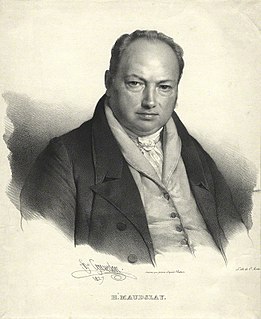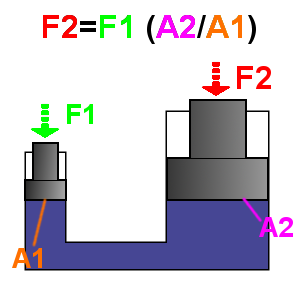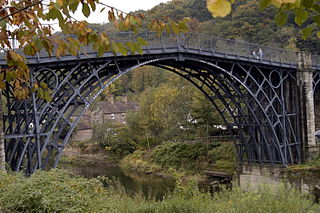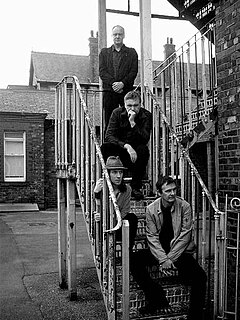This page is based on this
Wikipedia article Text is available under the
CC BY-SA 4.0 license; additional terms may apply.
Images, videos and audio are available under their respective licenses.

Henry Maudslay was an English machine tool innovator, tool and die maker, and inventor. He is considered a founding father of machine tool technology. His inventions were an important foundation for the Industrial Revolution.
The year 1814 in science and technology involved some significant events, listed below.
Joseph Clement was a British engineer and industrialist, chiefly remembered as the maker of Charles Babbage's first difference engine, between 1824 and 1833.

A hydraulic press is a machine press using a hydraulic cylinder to generate a compressive force. It uses the hydraulic equivalent of a mechanical lever, and was also known as a Bramah press after the inventor, Joseph Bramah, of England. He invented and was issued a patent on this press in 1795. As Bramah installed toilets, he studied the existing literature on the motion of fluids and put this knowledge into the development of the press.

Liverpool 78 is a live album by the Fall, first released June 4, 2001. These tracks have subsequently been reissued as part of an expanded Live at the Witch Trials.
The recording has historic interest but the sound quality is very poor.
Blue Orchids are an English post-punk band formed in Manchester in 1979, when Martin Bramah decided to quit The Fall having recorded that band's debut album Live at the Witch Trials.
Christened by Salford-based punk poet John Cooper Clarke the band recorded for Rough Trade and acted as backing band for the Velvet Underground's Nico before a 25-year period of intermittent activity and alternative identities.

An ironmaster is the manager, and usually owner, of a forge or blast furnace for the processing of iron. It is a term mainly associated with the period of the Industrial Revolution, especially in Great Britain.

Extricate is the 12th album by post-punk band the Fall. It was made immediately after bandleader Mark E. Smith divorced guitarist Brix Smith. Brix's departure helped define the sound of this album: her background vocals and relatively pop-oriented guitar, which had become mainstays of The Fall, are noticeably absent in this release. In one of the more unusual events in the group's career, she was replaced by founding former member Martin Bramah, who had previously left the group in 1979 to form his own group Blue Orchids.
Martin Beddington, better known by his stage name Martin Bramah, is an English singer-songwriter and guitarist, best known as a founding member of the Fall, Blue Orchids, Thirst, and Factory Star.

Sir Joseph Bailey, 1st Baronet was an English ironmaster and Conservative Party Member of Parliament (MP).

CKCB-FM is a Canadian radio station broadcasting at 95.1 FM in Collingwood, Ontario, with an adult contemporary format branded on-air as 95.1 The Peak FM.
Darby is an English locational surname and has since become a given name. Its prefix derives from the Old Norse djúr ("deer"), and the suffix -býr ("farm"/"settlement"). The oldest recorded surname dates to the period of 1160–1182 in Lincolnshire. Darby was a common pre-1800 alternative spelling of Derby, a city in England. People with the name or its variants include:

The Teardrops were a punk/new wave band formed in Prestwich, Greater Manchester, England, in 1978. The founders and always the core of this band were Trevor Wain, John Key and Jimmy Donnelly with various good friends from the Prestwich music scene:- Buzzcocks bassist Steve Garvey, members of The Fall; Martin Bramah, Karl Burns and Tony Friel and former member of V2 Ian Nance, as well as occasional contributions from Dave Brisbane, Helen Harbrook, Dave Price and Rick Goldstraw.

Bramah Joseph Diplock was an English inventor who invented the pedrail wheel in 1903 and the pedrail chaintrack, a type of caterpillar track, in 1910.

Factory Star are an English post-punk group, formed in Manchester in December 2008. The group was formed by singer/songwriter/guitarist Martin Bramah. Factory Star began life as Bramah, Tim Lyons (bass) and Brian Benson (drums). In April 2009 they were replaced by Steve Hanley (bass), Paul Hanley (drums), and John Paul Moran of Gnod & Rapid Pig (Keys). Bramah had two stints in The Fall - 1976 to '79 and '89 to '90 - and fronted several incarnations of Blue Orchids from 1979 - 2005. The Hanley brothers were also previously members of The Fall - Steve from 1979 to '98 and Paul from 1980 to '85. They got in touch with Bramah through Dave Simpson, thanks to Simpson's book The Fallen. The band performed in Anglesey on New Year's Eve in 2008, playing tracks from Bramah's solo album The Battle of Twisted Heel. Their first single "Lucybel" was made available on iTunes in 2009 and. The band performed a live session and were interviewed by Marc Riley on his BBC 6 Music show in July 2009.
Henry Grissell, sometimes known as "Iron Henry", was an English foundry-man who was responsible for the ironwork in a number of prestigious buildings in England, Russia, Austria, and Egypt.
The Bramah lock is a lock design that was created by Joseph Bramah in 1784. The design is the first known high-security lock design.











